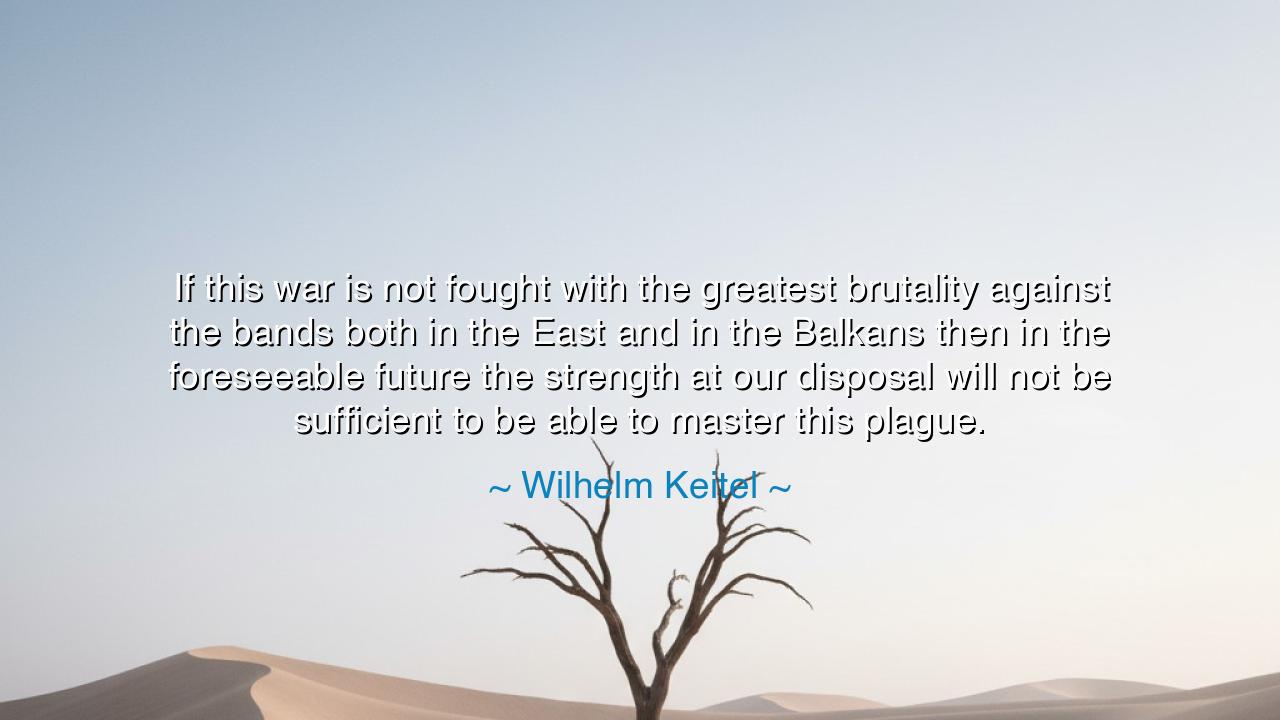
If this war is not fought with the greatest brutality against
If this war is not fought with the greatest brutality against the bands both in the East and in the Balkans then in the foreseeable future the strength at our disposal will not be sufficient to be able to master this plague.






Hear, O seekers of truth, the dark and heavy words of Wilhelm Keitel, a general of the German Reich, who declared during the Second World War: “If this war is not fought with the greatest brutality against the bands both in the East and in the Balkans then in the foreseeable future the strength at our disposal will not be sufficient to be able to master this plague.” These words are not a hymn of wisdom, but a chilling reminder of how power can be twisted by fear and cruelty, how strength can be misunderstood as mere brutality, and how leaders blinded by ideology can justify atrocities in the name of survival.
Keitel, as head of the German High Command, spoke these words at a time when partisan fighters in Eastern Europe and the Balkans resisted Nazi occupation with courage and tenacity. To him, these fighters were a plague; to their people, they were heroes. His command revealed the mindset of an empire that believed it could only survive by answering resistance with overwhelming cruelty—executions, reprisals, and scorched earth. In this way, his words became both origin and omen of the war crimes that followed, for they encouraged the destruction of villages, the killing of innocents, and the attempt to crush the spirit of whole nations through terror.
Yet history has judged such thinking harshly. For though Keitel believed that brutality would preserve strength, in truth it drained it. The more the Reich struck down the innocent, the more hatred it provoked, and the more resolute its enemies became. The partisans grew in number and boldness, supported by populations who would rather perish than bow. Thus, the very plague Keitel sought to master spread all the faster, proving that brutality cannot destroy resistance—it only feeds it.
Consider instead the wisdom of other ages. The emperor Ashoka of India, after waging bloody conquest at Kalinga, looked upon the bodies of the slain and realized that cruelty only multiplies sorrow and rebellion. He turned from violence to a rule of compassion, and his empire flourished in peace. Where Keitel exalted brutality, Ashoka discovered that the true mastery of men lies not in crushing their spirit, but in winning their loyalty through justice. Thus history contrasts the folly of terror with the wisdom of mercy.
The meaning of Keitel’s words, then, is not a truth to be embraced, but a warning to be heeded. They show us how fear can lead men to equate strength with savagery, and how such a path leads only to ruin. His legacy is not of victory but of judgment, for at Nuremberg he was condemned for war crimes, a testament that the world will not excuse cruelty disguised as necessity. The origin of his quote lies in an age of violence, but its lesson endures: strength without justice becomes weakness, and brutality destroys the one who wields it.
O children of tomorrow, learn from this: when trials come, resist the temptation to answer hardship with cruelty. Do not think that harshness alone will save you. True strength is not found in brutality, but in discipline, justice, and wisdom. The tyrant believes he is strong when he crushes his enemy; the wise leader knows he is strongest when he prevents enmity through fairness and care. Keitel’s mistake was to forget that cruelty can win battles but never hearts, and no nation can endure on fear alone.
Practical is this counsel: in your life, when confronted by opposition, choose not the path of brutality but of steadfast fairness. Be firm, yes, but do not let fear drive you to destroy what you should protect. Let your strength be guided by principle, your authority tempered with compassion, your actions marked not by desperation but by clarity of purpose. For the world remembers not the brutes who sow destruction, but the builders who sow peace.
Thus remember Keitel’s words not as wisdom but as warning: “If this war is not fought with the greatest brutality…” Such counsel led only to ruin, both for him and for the cause he served. Let future generations take heed: brutality cannot preserve strength, for strength divorced from justice is doomed to collapse. True power is found not in cruelty, but in righteousness—and it is this power that endures when empires of terror fall to dust.






AAdministratorAdministrator
Welcome, honored guests. Please leave a comment, we will respond soon